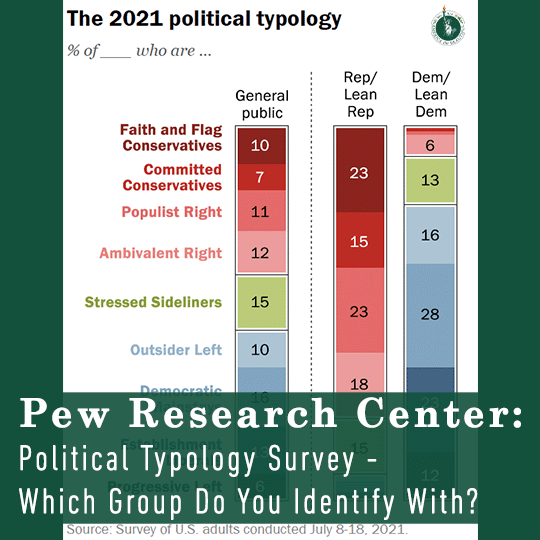Pew Research Center: Political Typology - Which Group Do You Identify With?
Last week, the Pew Research Center issued its latest report on political typology or groups within each political party. Over 10,000 US adults participated in a quiz, the eighth of its kind since 1987. This quiz is different from the previous studies in several ways. This quiz has the largest sample size and was nationally run. Participants were verified voters.
The quiz results found four separate groups based on values and attitudes within each political party. The survey analyzed the divisions within and between the parties.
Here is a link to the quiz: https://www.pewresearch.org/politics/quiz/political-typology/
The Four Republican Groups:
23% - Faith and Flag Conservatives: Vehemently conservative; most likely to say that government policies should reflect religious values and compromise in politics is just “selling out on what you believe in.” They believe that the US is above all other countries.
Oldest group
Christian
Very politically active
Strong Trump followers
15% Committed Conservatives: very conservative, but softer on immigration. They are in favor of working with our global allies in foreign policy.
Reagan Republicans
Pro-business
Favor limited government
Lukewarm towards Trump
Most educated
Very politically active
23% Populist Right: the least educated group; most likely to live in rural areas, critical of how the elites profit from the current economic system and corporations make too much profit.
Strong Trump supporters, the majority want him to run in 2024
Favor higher taxes on incomes above $400,000
Anti-immigration
18% Ambivalent Right: the youngest and least conservative of the four groups. They are for smaller government, lower taxes, have conservative views of race and gender.
Least religious of the four groups
Are not politically conservative
Identify as Democrats, or lean towards the Democratic party
In favor of legalizing marijuana
Pro-Choice
Want Trump to leave politics
Agreement within the Republican groups:
Believe the government is trying to do too many things that the private sector could do better
Believe each person should be responsible for his/her success
Believe that women and minorities have the same opportunities as White Men; the country has made great progress in the last 50 years to ensure equal rights for all Americans.
Issues that divide the Republican groups:
Corporate profits
Taxing the wealthy
Same-sex marriage
Government policies should support religious values
Expanding the production of fossil fuels
The Four Democratic Groups:
12% Progressive Left: majority White, non-Hispanic with very liberal views on most issues and support sweeping changes to address systemic racial injustice and to expand the social safety net.
Smallest group
Most politically active
Young and highly educated
2/3 White non-Hispanic
Majority identify as Democratic Socialists
23% Establishment Liberals: similar to the Progressive Left, but don’t see the need for large changes.
Very politically active
Highly educated
Racially and ethnically diverse
Strongly support Democratic leaders
Optimistic
Favor compromise
28% Democratic Mainstays: the largest group and the oldest average age, they are party loyalists and are moderate on some issues.
Largest group in the Democratic typology
Older, less-educated
Racially and ethnically diverse
Largest share of Blacks
Identify as moderate
Less liberal on immigration, military, and crime
16% Outsider Left: the youngest group, they voted for Joe Biden last year, are very liberal but frustrated with politics, including the Democratic party and its leadership.
Youngest group
One of the least politically active
Say other nations are better than the US
13% Stressed Sideliners:
Least politically involved
Mixed views
Unstable or low-income
Equally likely to be a Republican or Democrat
Agreement within the Democratic groups:
Largely united on most issues, for example, the role of strong government, economic safety net, and distrust of corporations.
Government should do more to solve problems
Economic system unfairly favors the wealthy and powerful
Raise taxes on corporations
Raise the minimum wage to $15/hour
Enact policy for equal rights for all Americans
Women still unequal with men
Respect foreign allies’ interests and compromise with them on foreign policy
Voting is a fundamental right of every American adult – make voting easier
Divisions within the Democratic groups:
Military spending
Differing views on racial justice and immigration policy
On key issues such as gun control, environmental policy, abortion, racial equality, most agree but the difference is the degree of support for the issue.
Economic policy – most agree that the wealthy and powerful are favored by our capitalist economy, the disagreement is how large this problem is and what changes should be implemented.
Takeaways from the survey:
Broad support for a third party, however, this support is from the Independent leaning groups - Ambivalent Right and Outsider Left which have little in common and are the least engaged politically. These groups were had the lowest voting rates in the 2020 election.
Racial injustice is the most divisive issue today.
Taxation and economic policy divide the GOP.
Click on this link to read the entire 18-page report.

